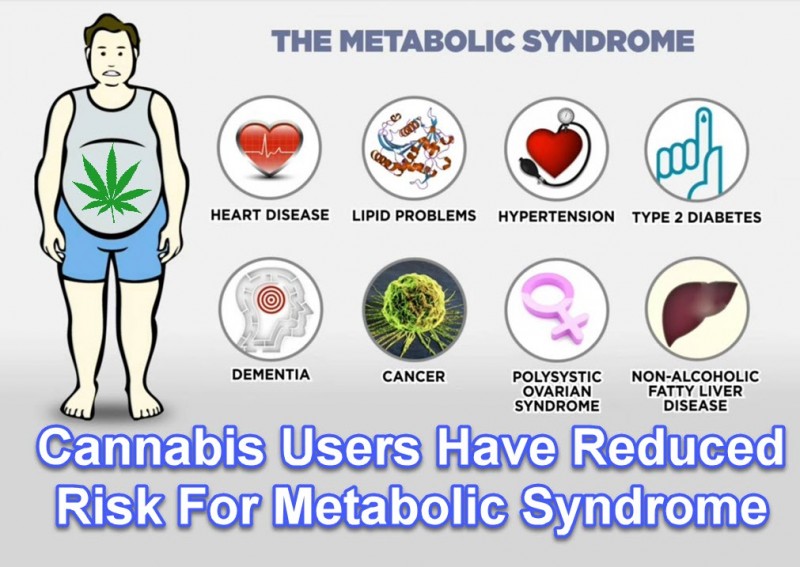Cannabis Users Have Reduced Risk For Metabolic Syndrome
How Medical Marijuana Helps with Metabolic Syndrome from CannabisNet on Vimeo.
Metabolic syndrome, also known as syndrome X, refers to a group of metabolic risk factors that are present in a single person. Metabolic risk factors are hypertension/high blood pressure, insulin resistance, increased risk for blood clotting, and cholesterol abnormalities.
Metabolic syndrome usually affects individuals who are obese or overweight; thus there is an increased association between some metabolic conditions and heart disease. Additionally, metabolic syndrome is also a risk factor for type 2 diabetes. This is because insulin resistance, or the reduced ability of cells to respond to insulin when transporting glucose from blood to muscle and other tissues, is known to cause type 2 diabetes.
Diagnosing metabolic syndrome may be difficult because there are usually no signs or symptoms. However, one of the most telltale clues that an individual may have this condition is through the presence of a large waistline. Additionally, type 2 diabetes may also be a precursor to metabolic syndrome.
According to the American Heart Association, 47 million Americans have metabolic syndrome. This translates to one in every 6 persons, and it’s more common among Hispanics, Asians, African-Americans, and Native Americans. But while metabolic syndrome is not a disease in itself, it certainly raises the risk factors for serious health conditions including stroke, heart attacks, and diabetes by as much as 5 times.
Science Says Cannabis Can Help
Cannabis use is associated with a much lower risk of developing metabolic syndrome.
A 2015 study conducted by researchers from the University of Miami found that cannabis users decrease their risk by as much as half for metabolic syndrome compared to those who don’t partake. Researchers looked at almost 8,500 participants who completed the 2005-2010 National Health and Nutrition Examination Surveys, which analyzed markers of metabolic syndrome with cannabis use to find a link.
They found that 13.8% of current cannabis users and 17.5% of past users had metabolic syndrome, although 19.5% of those who never used cannabis had metabolic syndrome. This translates to a 54% reduced risk for cannabis users in developing metabolic syndrome, or diabetes, stroke, and heart attack.
In a 2016 study published in Psychological Medicine, Australian researchers analyzed a random sample of 1,813 subjects. 63% of non-cannabis users (those that didn’t consume cannabis in the last year) had metabolic syndrome, while just 43.5% of frequent users (those who consumed cannabis at least once a week for a year).
The study’s authors concluded: ”Participants who reported using cannabis in the previous 12 months were significantly less likely than non-users to have the metabolic syndrome. This association remained significant for frequent users … after adjustment for a range of potential confounders, including lifestyle … and sociodemographic characteristics. … [T]hese data suggest that (cannabis) may … have a cardiometabolic protective effect.”
Although the Australian study was conducted on a sample group of patients with psychotic illnesses, the study’s authors also acknowledge previous research showing a correlation between cannabis use and a decreased risk for metabolic syndrome. “Of interest is the evidence emerging from general population studies showing the positive impact that cannabis may have on cardiometabolic risk factors of users compared with non-users: lower levels of fasting glucose and insulin, lower prevalence of diabetes, smaller waist circumference and body mass index (BMI) and higher levels of high-density lipoproteins (HDLs),” the authors stated.
“It is known that THC is stored in fat cells and can be slowly released over days and weeks, which may explain why cannabis can maintain its therapeutic effect days or weeks after last being used,” they add.
While it’s too early to conclude that cannabis itself does decrease metabolic syndrome, we can assume that other factors are at play. However, the positive effect of cannabis use on insulin resistance and blood sugar levels is quite well-documented.
In 2013, a study conducted by epidemiologists from the Harvard School of Public Health, the Beth Israel Deaconess Medical Center, and the University of Nebraska College of Medicine discovered that cannabis can indeed moderate blood sugar levels, reduce waist size as well as body mass index (BMI). The study was published in the American Journal of Medicine.
“Previous epidemiologic studies have found lower prevalence rates of obesity and diabetes in marijuana users,” says Murray Mittleman, M.D., lead investigator of the study. “Ours is the first study to investigate the relationship between marijuana use and fasting insulin, glucose, and insulin resistance.”
The participants in the study who used cannabis in the past month revealed 16% reduced fasting insulin level, 17% lower levels of insulin resistance, higher levels of the good cholesterol high-density lipoprotein cholesterol (HDL-C), and smaller waist circumference. Even if cannabis users tend to eat more calories than non-users, Mittleman says that “two large studies found that marijuana users tended to be leaner than non-users, even after accounting for other behavioral and clinical characteristics.”
OTHER STORIES YOU MAY ENJOY...
MARIJUANA STRAINS FOR METABOLIC SYNDROME, CLICK HERE.
OR..
CANNABIS FOR RESTLESS LEG SYNDROME, CLICK HERE.
OR..
CBD FOR DIABETES TAKES OFF, CLICK HERE.









